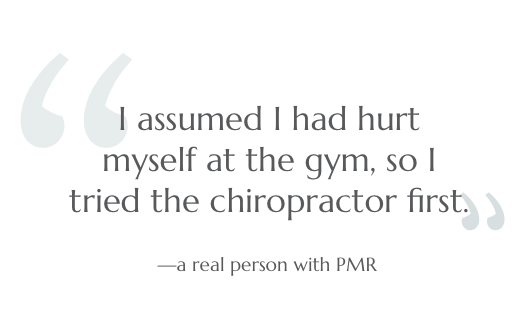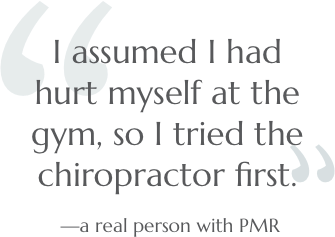PMR Treatment Journey

How is PMR diagnosed?
If you haven’t been able to get relief from your pain, talk to your primary care doctor. They can help find out if your pain is caused by PMR. Your primary care doctor may also refer you to a rheumatologist, who can diagnose and treat your PMR. A rheumatologist is a doctor who specializes in treating inflammatory rheumatic diseases.
PMR can be hard to diagnose because it causes symptoms that are similar to other conditions.

Stay positive
Talk with your doctors to get the answers you need while they confirm your PMR diagnosis.
To find out if PMR is the source of your pain, your rheumatologist may do certain tests, including:
Physical exam:
Looks at how you sit, stand, walk, and move your arms
Blood test:
Looks for inflammation in your body
Imaging tests:
Look at abnormal finding in your shoulders and hips
How is PMR treated?
It’s important for you to take an active role in your treatment plan. Treatment is more successful when you work with your doctor. Be sure to ask your doctor questions and let them know if you have any concerns.
Every person's PMR experience is different
- Talk to your healthcare team about your symptoms
- Make sure you share your health history
- Create a treatment plan that works for you

How do steroids work?
Standard of care for PMR begins with glucocorticoids (GCs). Low-to-moderate dosages of GCs have quickly helped PMR symptoms.
Steroids may provide relief by reducing the inflammation that causes your pain and stiffness. Your doctor will slowly lower your dose of steroids over time as you start to feel better.
The long-term use of GCs can be associated with the following:
Heart disease
Osteoporosis
(bone density disease)
Diabetes
For some people, symptoms can return if your steroid treatment dose is too low or you stop taking them. The goal of a steroid treatment plan is to relieve your symptoms and then to slowly lower the dose without causing pain or stiffness to return.
The impact of untreated symptoms
PMR can impact people's mobility and independence. People may go from living very active lives to more limited ones, even having difficulty getting out of bed.
People living with PMR may struggle to perform daily activities such as:

